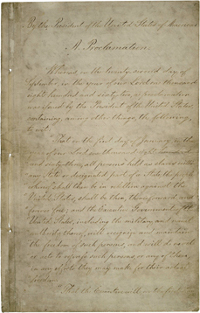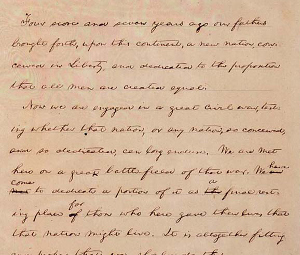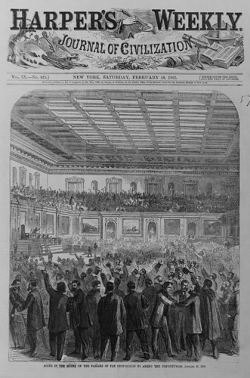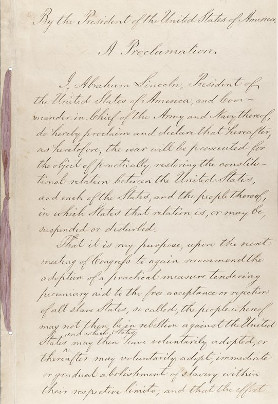Posted January 1st, 2013 by James DeWolf Perry
Category: Public History Tags: Abraham Lincoln, Civil rights movement, Emancipation Proclamation, Martin Luther King Jr., Sesquicentennial of the U.S. Civil War
 Today is the first day of 2013. This is an anniversary year that we’ve been talking about, and anticipating, for a long time here at the Tracing Center.
Today is the first day of 2013. This is an anniversary year that we’ve been talking about, and anticipating, for a long time here at the Tracing Center.
In 2013, we will celebrate the 50th anniversaries of major civil rights era milestones, including the March on Washington and Dr. King’s legendary “I Have a Dream” speech.
Over the coming year, the nation will also mark the 150th anniversaries of the Battle of Gettysburg and Lincoln’s Gettysburg Address, as well as the New York City Draft Riots (the violence of which was aimed mostly at the city’s free black population) and a host of other Civil War battles and dates.
The anniversaries of the Civil War and the civil rights movement are directly connected, as they represent two different, but closely related, stages in our society’s slow process of reckoning with its centuries-long embrace of slavery and racism. Exploring these anniversary dates, their connections, and their broader significance for racial healing and justice will constitute much of the Tracing Center’s work in the years 2013-2015.
Today, however, marks the 150th anniversary of perhaps the greatest of all of these events: Lincoln’s Emancipation Proclamation.
Read the rest of this entry »
 Today, January 31, 2015, marks the 150th anniversary of the narrow but momentous decision, by a bitterly divided U.S. Congress at the end of the Civil War, to abolish slavery throughout the United States.
Today, January 31, 2015, marks the 150th anniversary of the narrow but momentous decision, by a bitterly divided U.S. Congress at the end of the Civil War, to abolish slavery throughout the United States.


 Now that much of the hullabaloo surrounding the 150th anniversary of the Gettysburg Address has died down, perhaps we can finally ask ourselves: what really was the enduring significance of Lincoln’s famous oration?
Now that much of the hullabaloo surrounding the 150th anniversary of the Gettysburg Address has died down, perhaps we can finally ask ourselves: what really was the enduring significance of Lincoln’s famous oration? Today is the first day of 2013. This is an anniversary year that we’ve been talking about, and anticipating, for a long time here at the Tracing Center.
Today is the first day of 2013. This is an anniversary year that we’ve been talking about, and anticipating, for a long time here at the Tracing Center. Katrina Browne, our founder, appeared earlier today on a roundtable at the Huffington Post’s “HuffPost Live.” The topic was “
Katrina Browne, our founder, appeared earlier today on a roundtable at the Huffington Post’s “HuffPost Live.” The topic was “ I’m one of the jaded ones now.
I’m one of the jaded ones now. Exactly 150 years ago today, on September 22, 1862, Abraham Lincoln issued his first Emancipation Proclamation, declaring that as of January 1, 1863:
Exactly 150 years ago today, on September 22, 1862, Abraham Lincoln issued his first Emancipation Proclamation, declaring that as of January 1, 1863: